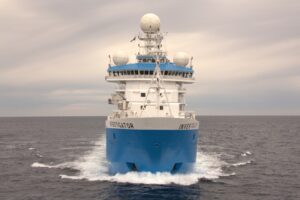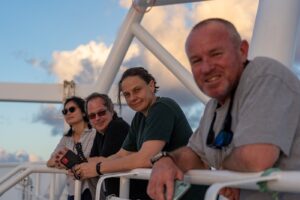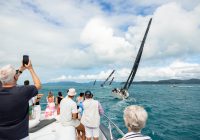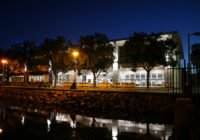By Tess Corkish, Kate Grarock, and Matt Marrison
Kate Grarock is a force of nature: a passionate ecologist at Bush Blitz, solo adventurer, YouTube creator, speaker and mum. She is a competitor on the current season of Alone Australia, where 10 outdoor survivalists are challenged with surviving completely alone for as long as they can in Tasmania’s wilderness in the middle of winter.
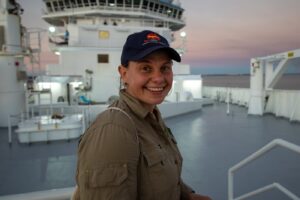
Kate recently spent time less alone aboard CSIRO’s research vessel (RV) Investigator on a collaborative voyage to survey marine life in the Indian Ocean Territories with Museums Victoria, Western Australian Museum and Parks Australia.
Kate is a participant in the current season of SBS’s Alone Australia.
CSIRO Kate about her experiences in the remote environments of the Indian Ocean and Tasmania.
Where did you go on your voyage, and how long were you at sea?
We boarded in Darwin amid the COVID-19 pandemic and a Darwin lockdown. It was an extremely challenging preparation stage, but it was amazing to see it all come together.
From Darwin, we spent about a week in transit towards Christmas Island. We spent about three weeks surveying this remote and incredibly biodiverse marine environment, before transiting back to Hobart. It was an incredible experience to spend 30 days at sea on the RV Investigator and transit such a vast array of Australia’s marine environment.
Who was on the voyage, what research was being done, and what was your role?
The majority of the team on board were scientists from Museums Victoria and Western Australian Museum. We were mapping seamounts (mountains under the sea), some of which are almost double the size of Mount Kosciuszko. We surveyed the seafloor to get an understanding of what species live down in the depths of the ocean. The ocean there is over five kilometres deep, which is mind-boggling. And these seamounts rise up to create unique assemblages of highly adapted sea life.
My role was to share the stories of what we were finding with the community. I presented a series of live streams to Australian classrooms to share the experience and findings with students.
How did you prepare for the voyage?
I thought long and hard about how to best look after my physical and mental health while on the voyage. I took a series of workout and yoga plans to ensure I took a little time each day to stay active. I also downloaded a lot of great audiobooks and podcasts to listen to.
What was it like adjusting to life at sea?
I used to be in the Navy, so I was pretty comfortable at sea. Thankfully I didn’t get seasick!
But I did notice on the voyage it was hard to find personal space. I love people, but it can be hard stepping out of your cabin and immediately being in the workplace. You don’t get time to sit out on the back deck before work with a coffee and wake up to the day. You’re just into it straight away. I tried hard to find quiet spots on the upper decks to take a few moments, but even that was hard to find some days.
What tips would you give someone preparing to go to sea or into the wilderness?
I would say that it’s most important to learn to meditate and work out your ‘why.’ You need to think long and hard about why you are out there, as things will get challenging and you may need to draw on that deeper reason.
What was your favourite moment on the voyage?
I loved coming around Cape Leeuwin and the seas opened up, with massive swell hitting us for the next three to four days as we travelled around the southern parts of Australia. I love the power of nature, it is so energising. I loved feeling so safe on a ship I know is purpose-built for conditions like that.
The deep ocean and the wilderness are both wild and remote places. What did you learn or appreciate about these environments from your experiences?
I love learning how insignificant we are. In our modern, comfortable lives it is often easy to forget the power of nature, and I love reminding myself of it. I love going to these places to connect with nature on a deeper level. It’s humbling.
Sitting on the bow of a ship and seeing nothing but ocean for five days, and trying to fathom water 5000 metres deep below your feet, is wild. I loved knowing the only thing that was keeping us alive in that environment was this incredible vessel, which has every comfort a person needs to survive. It’s a privilege to visit these places.
What is it like to go from a world full of people at every turn to having no one for miles around you for weeks?
It’s very strange indeed. I believe life is about balance, and I value both experiences. Each gives you an appreciation for the other, and the normal, comfortable life too.
Do you think we might see you back on RV Investigator at some point?
That remains to be seen, but that would be cool! It was a great trip.
For more information visit: www.csiro.au







